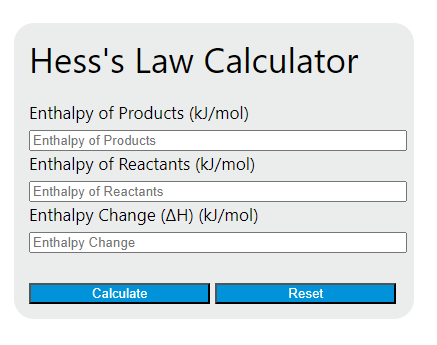Enter the sum of the enthalpy of formation of the products and the sum of the enthalpy of formation of the reactants into the calculator to determine the total enthalpy change. This calculator can also evaluate any of the variables given the others are known.
Hess’s Law Formula
The following formula is used to calculate the total enthalpy change using Hess’s Law.
ΔH = Σ ΔHf (products) - Σ ΔHf (reactants)
Variables:
- ΔH is the total enthalpy change (kJ/mol)
- ΔHf (products) is the sum of the enthalpy of formation of the products (kJ/mol)
- ΔHf (reactants) is the sum of the enthalpy of formation of the reactants (kJ/mol)
To calculate the total enthalpy change, sum up the enthalpy of formation of all the products and subtract the sum of the enthalpy of formation of all the reactants. The result will be the total enthalpy change for the reaction, regardless of the path taken.
What is Hess’s Law?
Hess’s Law, named after Russian chemist Germain Hess, states that the total enthalpy change during the complete course of a chemical reaction is the same whether the reaction is made in one step or in several steps. This is because enthalpy is a state function, meaning its value depends only on the current state of the system and not on the path taken to reach that state. Therefore, the total energy change in a chemical reaction is independent of the route by which the chemical reaction takes place.
How to Calculate Hess’s Law?
The following steps outline how to calculate the total enthalpy change (ΔH) using Hess’s Law:
- First, determine the enthalpy of formation (ΔHf) for each product involved in the reaction.
- Next, determine the enthalpy of formation (ΔHf) for each reactant involved in the reaction.
- Subtract the sum of the enthalpy of formation of the reactants (Σ ΔHf (reactants)) from the sum of the enthalpy of formation of the products (Σ ΔHf (products)).
- Finally, calculate the total enthalpy change (ΔH) using the formula: ΔH = Σ ΔHf (products) – Σ ΔHf (reactants).
- After inserting the values for ΔHf (products) and ΔHf (reactants) and calculating the result, check your answer with the calculator above.
Example Problem:
Use the following variables as an example problem to test your knowledge:
ΔHf (products) = -120 kJ/mol
ΔHf (reactants) = -80 kJ/mol
Calculate the total enthalpy change (ΔH) using the formula: ΔH = Σ ΔHf (products) – Σ ΔHf (reactants).
